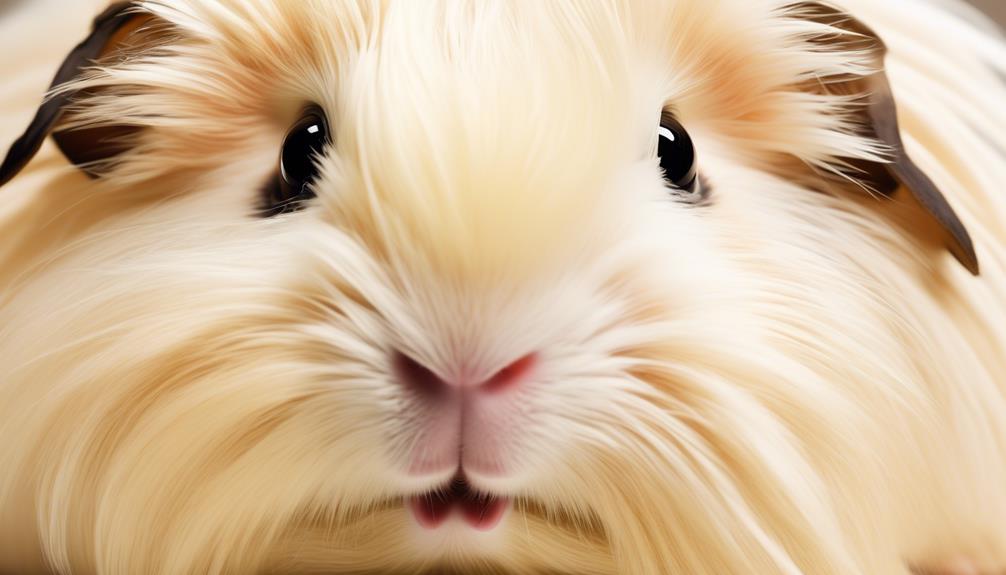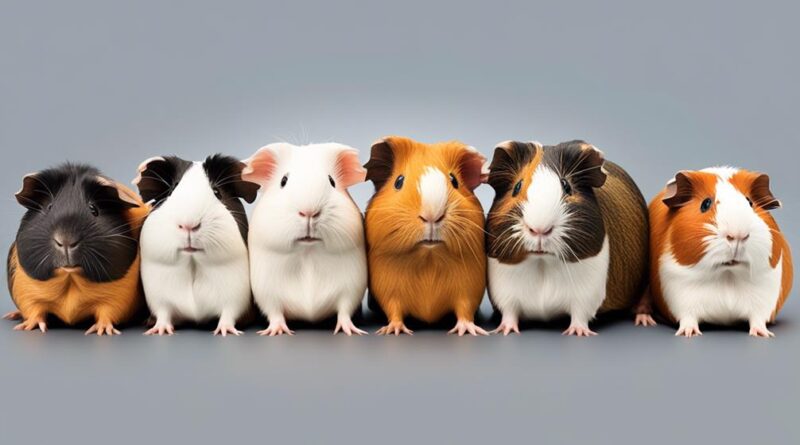Top 7 Most Popular Guinea Pig Breeds: A Guide
You've probably heard the saying, 'Like comparing apples to oranges.' Well, when it comes to guinea pig breeds, each one is as unique as the next.
From the classic American Guinea Pig to the luxurious Peruvian Guinea Pig, the world of guinea pig breeds is diverse and fascinating. But which one would be the perfect match for you?
There's a lot to consider, and this guide will help you navigate the wonderful world of guinea pig breeds, providing you with valuable insights to make an informed decision for your future furry friend.
American Guinea Pig
The American Guinea Pig breed is known for its friendly and sociable nature, making it a popular choice for families and individuals alike.
When it comes to grooming your American guinea pig, it's important to brush their coat regularly to prevent matting and keep it clean. A soft brush can be used to gently comb through their fur, and a small comb can help remove any tangles.
Additionally, it's essential to trim their nails regularly to prevent overgrowth and potential injury.
When it comes to dietary needs, your American guinea pig should have a diet that consists mainly of hay, supplemented with fresh vegetables and a small amount of pellets. Timothy hay is a great option for their primary food source, as it aids in digestion and helps wear down their teeth.
Fresh vegetables such as bell peppers, cucumbers, and leafy greens should be offered daily to provide essential vitamins and minerals. However, it's important to avoid feeding them foods high in calcium or sugar, as these can lead to health issues.
Always ensure they have access to clean, fresh water.
Abyssinian Guinea Pig
With its distinctive rosette-patterned coat, the Abyssinian guinea pig is a visually striking breed that's popular among pet enthusiasts.
Grooming an Abyssinian guinea pig is essential to maintain its beautiful coat. Regular brushing, at least once a week, helps to prevent matting and keeps the coat in good condition. Use a soft brush to gently comb through the rosettes, being careful not to pull on the delicate hair. Bathing should be infrequent, as guinea pigs are prone to catching a chill, but if necessary, use a gentle, pet-safe shampoo and ensure thorough drying to prevent skin issues.
When it comes to health concerns, Abyssinian guinea pigs are generally robust, but they can be predisposed to certain issues such as respiratory problems. Ensuring a clean living environment with good ventilation is crucial to prevent respiratory issues. Regular veterinary check-ups are important to catch any health concerns early.
Additionally, providing a diet rich in vitamin C, as guinea pigs can't produce this vitamin on their own, is essential for their overall health.
Peruvian Guinea Pig
Grooming a Peruvian guinea pig requires regular maintenance to keep its long, flowing coat in good condition and prevent matting. The Peruvian guinea pig is known for its luxurious, floor-length hair that requires special attention to maintain. Here are some grooming techniques and show standards to keep in mind:
- Daily Brushing: Use a soft brush to gently comb through the Peruvian guinea pig's hair on a daily basis to prevent tangling and matting.
- Bathing: Occasionally bathe the guinea pig with a gentle shampoo specifically formulated for small animals. Ensure thorough drying to prevent dampness in the coat.
- Trimming: Regularly trim the hair around the guinea pig's rear end to maintain cleanliness and prevent soiling of the long coat.
- Supportive Bedding: Provide appropriate bedding that won't tangle the guinea pig's hair, such as fleece or soft, clean hay.
- Show Standards: If you plan to show your Peruvian guinea pig, ensure that its coat is well-maintained, clean, and free of mats. The coat should be glossy, straight, and flowing.
When grooming a Peruvian guinea pig, it's essential to be gentle and patient, as their long hair can easily tangle. Following these grooming techniques and adhering to show standards will help ensure that your Peruvian guinea pig maintains a healthy, lustrous coat and meets the requirements for show competitions.
Teddy Guinea Pig
To maintain the distinctive coat of a Peruvian guinea pig, you may also be interested in the unique characteristics of the Teddy guinea pig breed. The Teddy guinea pig is known for its dense, wiry coat that stands up all over its body, giving it a fuzzy and cuddly appearance. These adorable pets have a friendly and outgoing personality, making them a popular choice for guinea pig enthusiasts.
When it comes to grooming, Teddy guinea pigs require regular brushing to prevent their dense coat from tangling and matting. Using a soft bristle brush, gently comb through their fur at least once a week to keep it clean and free from any debris.
In addition to grooming, understanding the personality traits of a Teddy guinea pig is important. These little creatures are known for being social and active, often enjoying interaction with their owners and other guinea pigs. They thrive on companionship and may become lonely if kept alone, so it's recommended to keep them in pairs or groups.
Teddy guinea pigs are also quite vocal and will often squeak or chirp to communicate their needs or excitement. Providing them with a stimulating environment and regular playtime will help keep them happy and entertained.
Skinny Guinea Pig
The Skinny guinea pig, also known as the Baldwin guinea pig, has a unique appearance due to its hairless body and wrinkled skin. Despite their unusual look, these guinea pigs are affectionate and make great pets.
Here are some important points to consider when caring for a Skinny guinea pig:
- Skinny guinea pig care: Due to their lack of fur, Skinny guinea pigs are more sensitive to temperature changes. It's essential to keep them in a warm environment and provide them with cozy bedding. Regular skin moisturization is also crucial to prevent dryness and potential skin issues. Additionally, their diet should include foods rich in vitamin C to support their immune system and skin health.
- Regular veterinary check-ups: Skinny guinea pigs are prone to skin problems, so it's important to schedule regular check-ups with a knowledgeable exotic animal veterinarian. This will help in early detection and treatment of any skin issues or health concerns.
- Gentle handling: Their delicate skin makes them more susceptible to injuries. When handling a Skinny guinea pig, it's important to be gentle and cautious to avoid causing any harm.
- Social interaction: These guinea pigs are social animals and thrive on companionship. It's recommended to keep them in pairs or small groups to ensure they receive enough social interaction and mental stimulation.
- Skinny guinea pig health concerns: Besides skin issues, Skinny guinea pigs are prone to dental problems and obesity. Providing them with a balanced diet and regular dental check-ups can help prevent these health concerns.
Coronet Guinea Pig
With a majestic crest of hair adorning its head, the Coronet guinea pig is a charming and distinctive breed that captivates with its regal appearance. Care for Coronet guinea pigs involves some specific grooming techniques due to their impressive long hair. Regular brushing is essential to prevent tangles and matting of their flowing locks. Use a soft brush to gently comb through their fur, paying particular attention to the crest on their head. When bathing your Coronet guinea pig, be sure to thoroughly dry their coat to prevent skin issues. Additionally, providing a well-balanced diet, spacious living environment, and regular health check-ups are crucial for their well-being.
Coronet guinea pigs are often showcased in competitions that adhere to strict show standards. The American Coronet Cavy Club and other similar organizations have set guidelines for the ideal appearance of Coronets in competitions. This includes a well-shaped crest that should be symmetrical, full, and flowing, adding to the regal look of the guinea pig. Breeders and owners who wish to participate in shows should familiarize themselves with these standards to prepare their Coronets accordingly.
Competitions offer a platform to showcase the beauty and charm of Coronet guinea pigs, while also providing opportunities for enthusiasts to connect and share their knowledge and experiences.
Silkie Guinea Pig

When caring for a Silkie guinea pig, ensure regular grooming to maintain their luxurious, long coat and prevent matting. The Silkie guinea pig's coat is one of its most distinctive features, but it requires dedicated care to keep it in top condition. Here are some essential tips for caring for a Silkie guinea pig:
- Daily Brushing: Due to their long hair, Silkie guinea pigs need daily brushing to prevent tangles and matting. Use a soft brush to gently comb through their coat, starting from the back and working towards the head.
- Bathing: While not as frequent as brushing, occasional baths are necessary for Silkie guinea pigs to keep their coat clean and free from oils and debris. Use a gentle, guinea pig-friendly shampoo and ensure thorough drying to prevent skin issues.
- Trimming: Regular trims of the Silkie guinea pig's hair around the hindquarters are essential to maintain cleanliness and prevent feces and urine from getting trapped in the coat.
- Social Interaction: Silkie guinea pigs are known for their gentle and sociable nature. Regular interaction and handling are crucial for their mental and emotional well-being.
- Playtime: Providing a spacious and safe environment for your Silkie guinea pig to exercise and explore is important. They enjoy playtime outside of their cage, but always supervise them to ensure their safety.
In terms of temperament, Silkie guinea pigs are known for their gentle and docile behavior. They're generally friendly and enjoy human interaction, making them great companions for both adults and children. However, they may require a bit more grooming and maintenance compared to other guinea pig breeds due to their long coat.
Frequently Asked Questions
Are There Any Specific Health Concerns or Common Illnesses Associated With Each of These Guinea Pig Breeds?
When it comes to guinea pig breeds, each one may have specific health concerns or common illnesses. Factors like breed size variations and lifespan differences can also influence their susceptibility to certain health issues.
What Are the Average Lifespan and Size Differences Between These Guinea Pig Breeds?
The average lifespan and size differences between these guinea pig breeds vary. Each breed may have common health concerns, training and socialization needs, dietary and grooming requirements, as well as temperament differences.
Can These Guinea Pig Breeds Be Easily Trained or Socialized Compared to Other Breeds?
Training and socialization of guinea pigs vary by breed. Some are easier to train and more social than others. When comparing breeds, consider behavior differences and research specific breed traits to determine which is best for your needs.
Are There Any Specific Dietary or Grooming Requirements Unique to Each of These Guinea Pig Breeds?
Each guinea pig breed has unique dietary needs and grooming requirements. It's important to research and understand the specific needs of your guinea pig breed to ensure they receive proper care and attention.
How Do the Temperaments of These Guinea Pig Breeds Differ From One Another?
Each guinea pig breed has unique temperament differences. Some may require more socialization challenges, while others may have lower training difficulty. It's important to consider grooming needs and personality traits when choosing a guinea pig breed.
Conclusion
So there you have it, the top 7 most popular guinea pig breeds. Whether you're drawn to the long, flowing hair of the Peruvian or the unique appearance of the Skinny guinea pig, there's a breed out there for everyone.
Consider the temperament, grooming needs, and space requirements of each breed before choosing the perfect guinea pig for you.
Happy guinea pig hunting!
